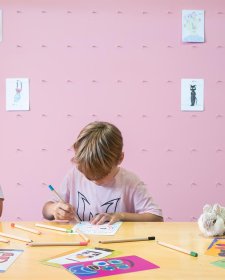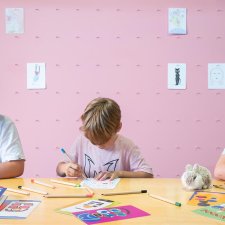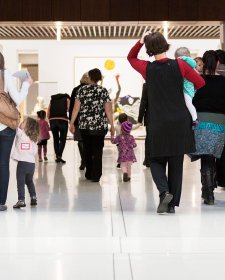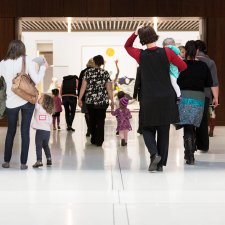- About us
- Support the Gallery
- Venue hire
- Publications
- Research library
- Organisation chart
- Employment
- Contact us
- Make a booking
- Onsite programs
- Online programs
- School visit information
- Learning resources
- Little Darlings
- Professional learning
When Helena Rubinstein (1872–1965) sat for British artist Graham Sutherland, she wore a gown by fashion designer Cristóbal Balenciaga, which Sutherland thought made her look like an empress. To render the colour and texture exactly, he cut a sample of fabric from the hem of the dress. The artist made three paintings of her; she acquired this one for herself and displayed it at her home in New York City.
Rubinstein started one of the world’s first global cosmetic companies, Helena Rubinstein, in Melbourne in 1902, after moving to Australia from Poland in 1896. Her first beauty salon specialised in a product said to contain rare herbs from eastern Europe, but which was made with lanolin from local sheep fleeces, ‘vegetable oil, mineral oil and wax’. From 1908 she opened salons in London, Paris and New York. Other stand-alone and department store salons followed. Integral to Rubinstein’s success was her awareness that she was the most effective ambassador for the brand. Her wardrobe, consequently, included gowns by the most illustrious designers. In her 1964 memoir, Rubinstein described Sutherland’s portraits as ‘incredibly bold, domineering interpretations of what I had never imagined I looked like’, but conceded that ‘as paintings they were indeed masterpieces’.
Purchased with funds provided by Marilyn Darling AC, Tim Fairfax AC and the Sid and Fiona Myer Family Foundation 2015
© Estate of Graham Sutherland
This is an oil on canvas portrait of Helena Rubinstein – entrepreneur and founder of her own global cosmetics corporation.
The gold-and-cream framed work, is approx. 2m high and 1m wide, showing a view of Helena from head to below her knees. Helena is seated, her head held high, a mature woman exuding glamour and style wearing a sumptuous, ruby-red gown juxtaposed against a dove grey background.
Helena Rubenstein’s body is turned slightly, her left side more prominently displayed and she gazes out of the portrait to her right, looking rather tense. Her mid-length black hair is pulled tightly back, her sleek up-do highlights her high forehead and clearly visible grey hairs just above her left ear. Her thick hair is tied at her nape, soft curls gather in a black ribbon hugging the back of her neck.
Furrows mark the commencement of an arch to each small, well-kept eyebrow. There are creases in the soft skin around her dark eye on the left side of her face. Here, her complexion is smooth and liberally dusted with pink blusher. She has wide nostrils and a prominent nose casting a thin shadow onto her (barely visible) right cheek.
Helena’s olive skin shows signs of age at the corners of her thin, ruby-red mouth and noticeably defined jowl. A patch of shadow accentuates the soft, vertical folds in the paper-thin skin of her neck.
She has large ears and creases nose to mouth-corners. She holds herself rigid, ill-at-ease, maintaining proud posture and staring beyond us.
Her face is made up and black/brown lines outline neat eyebrows, her eyelids and eye lashes. Her nose and chin tilt upwards. Her thin lips are closed and brightly outlined in red.
On her left ear is a large tear-drop shaped earring encrusted with pearls and diamonds. A sumptuous 5-stringed pearl necklace caresses her neck and the lower strands rest on the material of her dress.
Two large oval shaped rings adorn both stiffly crossed hands resting on her lap. Her left hand holds a 5cm gold, leaf-shaped object.
Helena’s rich, ruby-red brocade gown by designer Balenciago bears a detailed floral pattern in shades of gold, white, light blues and greens. The bodice has a high neckline, three-quarter sleeves and flairs out over the skirt at hip level. Helena’s full skirt drapes loosely around her hips and upper legs, occupying the whole lower quarter of the portrait.
The dress’s floral pattern becomes less and less defined towards the bottom edge of the portrait, disseminating to smudged shades of paler reds, orange and pinks as it continues to flow from the seated woman out beyond the bottom edge of the picture frame.
The artist – Graham Sutherland has signed his work in the bottom right corner of the canvas.
Audio description written by Pauline McCreath and voiced by Carol Wellman Kelly
Tim Fairfax AC (54 portraits supported)
Marilyn Darling AC (33 portraits supported)
The Sid and Fiona Myer Family Foundation (9 portraits supported)



Drop into the Gallery any time for free creative activities inspired by artist Thom Roberts and his exhibition, The Immersive World of Thom Roberts.



Celebrate NAIDOC Week this winter with Portrait Play, a gentle and creative program for families and young children.



Drop into the Gallery for free artmaking activities inspired by the exhibition In Bloom.